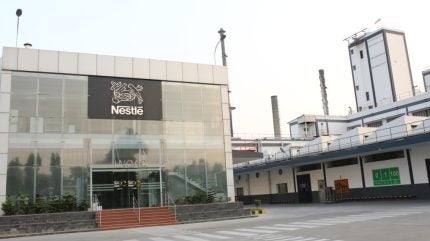
Nestlé’s Indian arm has entered into a venture with pharma group Dr Reddy’s Laboratories to make and sell medical-nutrition products and supplements.
The publicly-listed Nestlé India will initially hold 49% of the venture, with the Hyderabad-based Dr Reddy’s owning the rest.

Discover B2B Marketing That Performs
Combine business intelligence and editorial excellence to reach engaged professionals across 36 leading media platforms.
Under the terms of their agreement, Nestlé India has a call option to increase its shareholding up to 60% after six years “at a fair market value”, a stock-exchange filing read.
“We have been on a journey where we strive to add value to the lives of our consumers through powerful brands and products. This joint venture is another important step in that direction, allowing us to bring our science-backed nutritional solutions to more consumers across the country by leveraging Dr. Reddy’s robust retail and distribution network,” Suresh Narayanan, the chairman and MD of Nestlé India, said. “Dr. Reddy’s is a trusted name in the pharmaceutical space and shares our commitment to provide access to high-quality products.”
The companies plan to work together in India and “other agreed territories”, the stock-exchange announcement added.
Nestlé India and Dr Reddy’s plan to target categories the statement listed as “metabolic, hospitals nutrition, healthy ageing, general wellness, women’s health and child nutrition”.

US Tariffs are shifting - will you react or anticipate?
Don’t let policy changes catch you off guard. Stay proactive with real-time data and expert analysis.
By GlobalDataThe soon-to-be partners expect to get the venture up and running in the second quarter of Nestlé India’s 2024/2025 financial year, which started on 1 April.
Nestlé India published news of the deal alongside the publication of a set of financial results covering the 15 months to the end of March.
During the period, the company – in which Nestlé owns a majority stake – generated sales of Rs242.76bn ($2.91bn), contributing to a net profit of Rs39.33bn.
Narayanan said: “Confectionery delivered strong performance, fuelled by KitKat, making India the second-largest market for the brand globally. Our beverages business recorded robust performance.
“Milk products and nutrition witnessed strong growth despite inflationary pressures. Prepared dishes and cooking aids registered strong growth across [the] portfolio led by Maggi Noodles and Maggi Masala-ae-Magic. India emerged as the largest market worldwide for Maggi.”
Earlier this month, India’s consumer court has cleared Nestlé of government allegations of “unfair trade practices” related to the lead contamination scare that rocked the Maggi brand in 2015.
Referring to the venture with Dr Reddy’s, as well as the launch of Nespresso coffee in India, he added: “The pursuit of new platforms and categories is a key component of Nestlé India’s overall growth strategy and reflects our commitment to anticipating and responding to evolving market trends and consumer preferences.”
According to Nestlé’s 2023 annual report, the company had eight factories in India covering milk products, ice cream, prepared dishes, cooking aids, beverages, confectionery, plus its nutrition and Health Science business.
This month has also seen Public Eye, a Zurich-based NGO, accuse Nestlé of adding sugar and honey to certain brands of infant-formula and breakfast cereals in poorer countries, a practice not evident in Europe.
Reacting to the report, Nestlé said in a statement provided to Just Food: “We apply the same nutrition, health and wellness principles everywhere.
“Baby food is a highly regulated category. Everywhere we operate, our portfolio complies with local regulations or international standards, including labelling requirements and thresholds on carbohydrate content that encompasses sugars.
“Over the past decade, Nestlé has reduced by 11% the total amount of added sugars in our infant cereals portfolio worldwide.”




